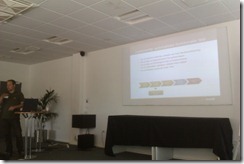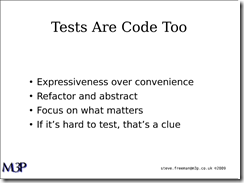Even though this is a part of my “warm-up” blog posts for GOTO Aarhus 2012 Conference, I’ll start out referring to a related event this week. At our latest meeting in the Danish TFS User Group, held at the Microsoft office in Hellerup, Rune Abrahamsson from BRFkredit had a presentation on how they are using http://cuite.codeplex.com/ for developing functional tests for one of their systems. If you are interested, Mads (our agile coach at ScanJour) has also blogged from the user group here.
Although the people attending the TFS Users Group meetings are mostly developers, we often have at least one testing-related topic on the agenda, and this time it was clear that many of the present developers does have experience with developing functional tests, often using a UI automation framework like Microsoft Coded UI. So even before attending the GOTO Aarhus 2012 Conference, it seems I can conclude that developers are writing functional tests, which pleases me, as I think the people writing the software, also are the best at writing automation for it. The testers can then do actual quality assurance, by ensuring that the customer requirements have been automated, as well as performing exploratory testing to exercise the software in new ways.

Sorry for the bad picture quality; the slide shows at the bottom which areas (including functional UI tests) are covered by developer tests, whereas e.g. exploratory tests are performed by their manual testers (which are actually domain experts, not full-time testers). I find it very positive to see a development team take quality seriously, by including test automation, when they are in a situation where they are lacking testers. I guess this is not an uncommon scenario in the industry, that you have to get test assistance from other teams/departments.
And it makes me wonder if manual testers should be forced to not do manual scripted test at all, but only do exploratory testing and quality assurance, since the developers will fill the gap themselves, by automating the scripted test cases? 
To put this in the context of this years GOTO conference, I have been looking at the biographies of some of the speakers, and found a video by Steve Freeman on Sustainable Test-Driven Development, where he touches topics like:
- Too coupled production and test code, which makes refactoring difficult (beginning of video)
- Test code structure (similar to Given/When/Then pattern of e.g. SpecFlow)
- “You come back to the code after 6 months, and forgot why you did this” (approx. 13:00)
- Patterns for writing test code. As simple as good variable naming, using DSL syntax to have more more readable test code
- Prepare for your test to fail at some point, simply by having clear error messages when it happens (“Explain yourself”, “Describe yourself” and “Tracer Objects” around 23 mins into the video).
- Make your tests robust, e.g. “Only Enforce Order When It Matters” (around 40:00)
- “Tests Are Code Too” (43:35), which is the last slide and also seems to be the headline for this presentation
The last slide is shown here:

Although all four bullets here are important, I have myself faced the “If it’s hard to test, that’s a clue” problem, when developing unit tests, both for production code as well as test automation framework code. As an automation tester, I also regularly have the problem when writing automated functional tests against production code, e.g. missing id’s on UI controls, no clear interface for testing etc. When the development team is writing automated functional tests as part of definition of done, it should hopefully result in code better suited for automation. And then the general conclusion, that test automation should be treated like any other code activity.
This year Steve Freeman has a session on Raspberry Pi with extra toppings Monday at 13:20, which unfortunately is a timeslot where I have also some other sessions I would like to see (What is value and Mythbusting Remote Procedure Calls), but it might be that I have to change my mind; as it could also be fun to get an introduction to the Raspberry Pi.
After watching this video, I feel confident that I will meet developers at the GOTO Aarhus 2012 Conference this year with a quality/testing mindset, and I’m looking forward to talk with you about your view on test automation, and how I as an automation tester can bring value and increase the quality of our software products, even if it's no longer a dedicated test automation developer writing the functional tests.
Feel free to comment on this post below.